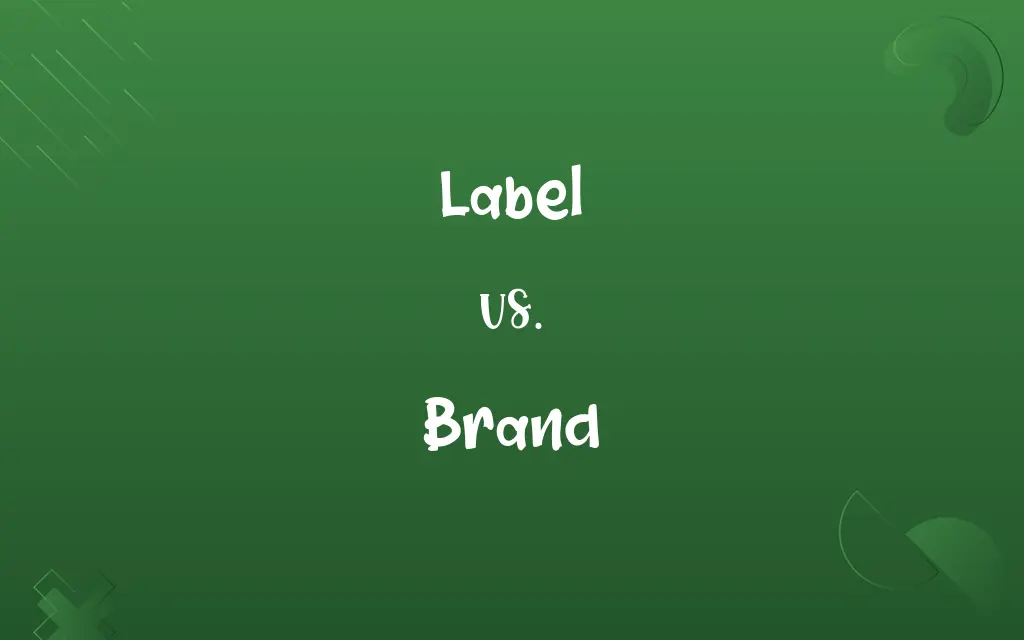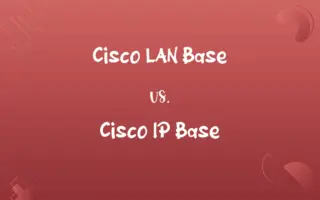Label vs. Brand: Know the Difference

By Hifza Nasir & Shumaila Saeed || Published on May 8, 2024
Label often refers to a tag identifying the maker, characteristics, or quality of an item, while brand represents the identity, reputation, and values of a company or product line.

Key Differences
Labels are primarily used for identification and providing information about a product, such as its manufacturer, size, and care instructions. Whereas, brands are a broader concept that encompasses the perceived image and reputation of a product or company, shaped by consumer experiences, advertising, and the quality of the products or services offered.
Hifza Nasir
May 08, 2024
While a label can be seen as a physical marker affixed to products, a brand is intangible, existing in the minds of consumers as a set of beliefs and associations about a product or company. On the other hand, brands influence customer loyalty and purchasing decisions by embodying the company’s ethos and values.
Shumaila Saeed
May 08, 2024
Labels are regulated by laws and standards to ensure that they provide accurate information to consumers, especially in industries such as food, pharmaceuticals, and apparel. Brands, however, are crafted through marketing strategies and customer experiences, aiming to create a distinctive identity and emotional connection with the target audience.
Hifza Nasir
May 08, 2024
Labels serve a functional role, facilitating product differentiation and enabling consumers to make informed choices based on the information provided. In contrast, brands serve a strategic role, differentiating a company or product in the marketplace and building a competitive advantage through brand equity.
Hifza Nasir
May 08, 2024
While labels can change to reflect updated information or regulatory requirements, a brand’s identity is developed over time, with changes made carefully to avoid alienating existing customers. Brands are thus a long-term investment in a company’s image and reputation, whereas labels are more immediately concerned with compliance and information.
Shumaila Saeed
May 08, 2024
ADVERTISEMENT
Comparison Chart
Definition
A tag or sticker on a product providing specific information.
A unique identity representing the values and reputation of a company or product.
Shumaila Saeed
May 08, 2024
Purpose
To identify, inform, and comply with regulations.
To differentiate, create emotional connections, and build loyalty.
Hifza Nasir
May 08, 2024
Regulation
Subject to specific industry regulations for accuracy.
Governed by marketing strategies and consumer perception.
Shumaila Saeed
May 08, 2024
Impact on Consumers
Helps make informed decisions based on product information.
Influences purchasing decisions through emotional connections and brand loyalty.
Hifza Nasir
May 08, 2024
ADVERTISEMENT
Label and Brand Definitions
Label
Identification tag.
The label on the dress indicates it is made of 100% silk.
Hifza Nasir
Mar 03, 2024
Brand
Identity marker.
The Nike swoosh is an instantly recognizable brand symbol.
Shumaila Saeed
Mar 03, 2024
Brand
Emotional connection.
Disney’s brand evokes feelings of magic and wonder.
Hifza Nasir
Mar 03, 2024
Label
Product differentiation.
The label colors help distinguish different flavors.
Hifza Nasir
Mar 03, 2024
ADVERTISEMENT
Brand
Loyalty and trust.
Customers remain loyal to the Coca-Cola brand for its consistent taste.
Hifza Nasir
Mar 03, 2024
Label
Quality assurance.
The label certifies the product has passed all safety tests.
Shumaila Saeed
Mar 03, 2024
Brand
Reputation builder.
Apple’s brand is associated with innovation and quality.
Hifza Nasir
Mar 03, 2024
Label
Regulatory compliance.
The label must show the product's manufacturing date.
Hifza Nasir
Mar 03, 2024
Brand
Value proposition.
The Tesla brand represents sustainability and cutting-edge technology.
Dua Fatima
Mar 03, 2024
Label
An item used to identify something or someone, as a small piece of paper or cloth attached to an article to designate its origin, owner, contents, use, or destination.
Hifza Nasir
Mar 02, 2024
Brand
A trademark or distinctive name identifying a product, service, or organization.
Hifza Nasir
Mar 02, 2024
Label
To identify or designate with a descriptive term; describe or classify
"He missed two crucial penalty kicks ... and was labeled a loser by the previously loyal British press" (Phil Ball).
Hifza Nasir
Mar 02, 2024
Brand
An association of positive qualities with a widely recognized name, as of a product line or celebrity
The company tried to improve its brand by donating money to charity.
Hifza Nasir
Mar 02, 2024
Brand
A distinctive category; a particular kind
A brand of comedy that I do not care for.
Hifza Nasir
Mar 02, 2024
Brand
A mark indicating identity or ownership, burned on the hide of an animal with a hot iron.
Hifza Nasir
Mar 02, 2024
Brand
To provide with or publicize using a brand name or other readily recognized identifier
A line of cars branded with mythological names.
Hifza Nasir
Mar 02, 2024
Repeatedly Asked Queries
What is a brand?
A brand is the identity, reputation, and set of values associated with a company or product line, as perceived by the public.
Hifza Nasir
May 08, 2024
Why are labels important?
Labels provide essential information to consumers, enabling them to make informed choices about the products they purchase.
Shumaila Saeed
May 08, 2024
What is a label?
A label is a tag or sticker on a product that provides information about its maker, characteristics, or quality.
Shumaila Saeed
May 08, 2024
How is a brand developed?
A brand is developed through consistent marketing efforts, customer experiences, and the embodiment of the company’s values and mission.
Hifza Nasir
May 08, 2024
Can a product have both a label and a brand?
Yes, products often have both labels for information and compliance, and brands for marketing and identity purposes.
Dua Fatima
May 08, 2024
What role does a label play in product differentiation?
Labels help differentiate products by providing information that distinguishes one product from another, such as ingredients, origin, or brand.
Hifza Nasir
May 08, 2024
Can labels affect a brand's perception?
Yes, accurate and transparent labels can enhance a brand's perception by building trust and credibility with consumers.
Shumaila Saeed
May 08, 2024
How do labels and brands differ in purpose?
Labels aim to inform and comply with regulations, while brands seek to create emotional connections and differentiate in the marketplace.
Hifza Nasir
May 08, 2024
How are labels regulated?
Labels are subject to industry-specific regulations to ensure they provide accurate and helpful information to consumers.
Shumaila Saeed
May 08, 2024
How do companies use branding to compete in the market?
Companies use branding to differentiate their products, create emotional connections with consumers, and build loyalty to gain a competitive advantage.
Hifza Nasir
May 08, 2024
How does a brand influence consumer behavior?
A brand influences consumer behavior by creating a perception of quality, value, and trust, encouraging brand loyalty and repeat purchases.
Dua Fatima
May 08, 2024
How can a new company establish its brand?
A new company can establish its brand by clearly defining its values, consistently delivering quality products or services, and engaging effectively with its target audience through marketing and customer service.
Shumaila Saeed
May 08, 2024
Why is branding important?
Branding is crucial for creating a distinctive identity, building customer loyalty, and establishing an emotional connection with the target audience.
Hifza Nasir
May 08, 2024
What happens when a label is misleading?
Misleading labels can lead to consumer distrust, legal penalties, and damage to the brand's reputation.
Hifza Nasir
May 08, 2024
How do consumers benefit from strong brands?
Consumers benefit from strong brands through consistent quality, reliability, and the assurance of purchasing from a trusted source.
Hifza Nasir
May 08, 2024
Share this page
Link for your blog / website
HTML
Link to share via messenger
About Author
Written by
Hifza NasirCo-written by
Shumaila SaeedShumaila Saeed, an expert content creator with 6 years of experience, specializes in distilling complex topics into easily digestible comparisons, shining a light on the nuances that both inform and educate readers with clarity and accuracy.









































































